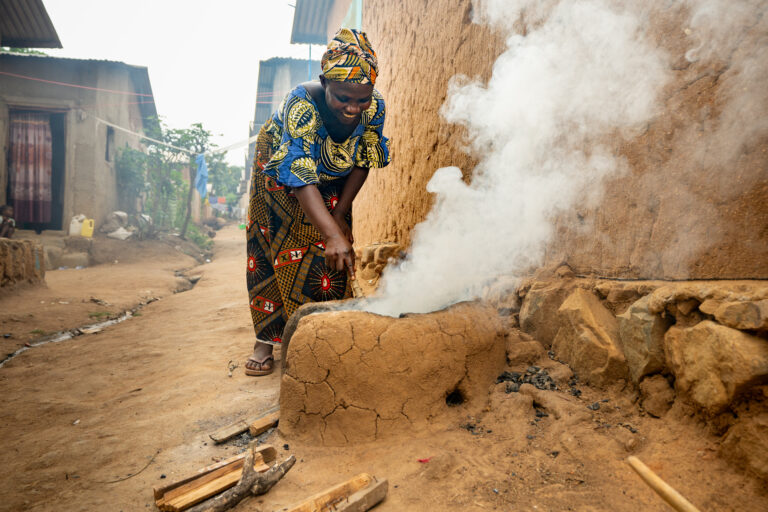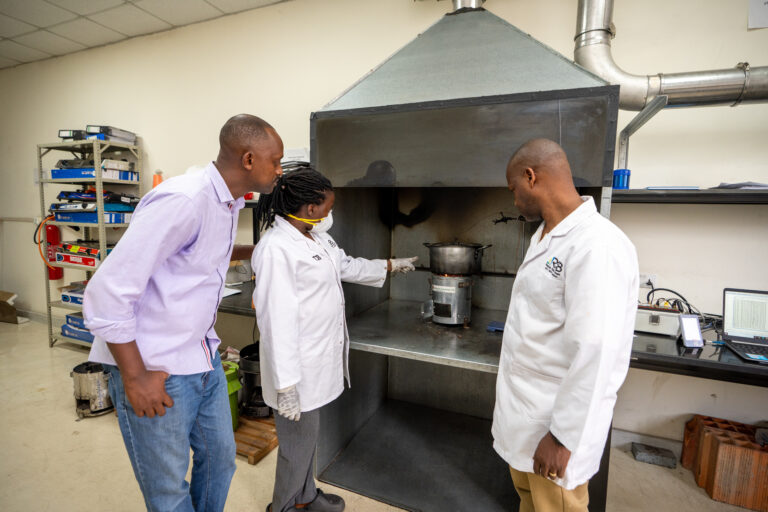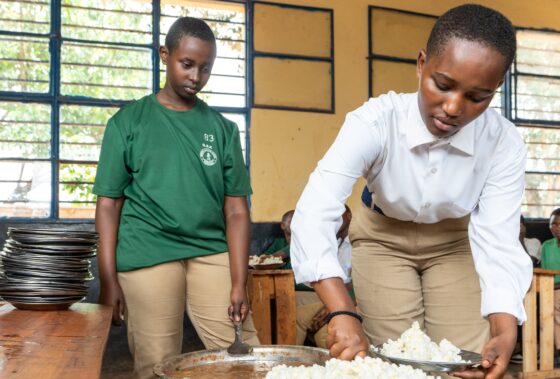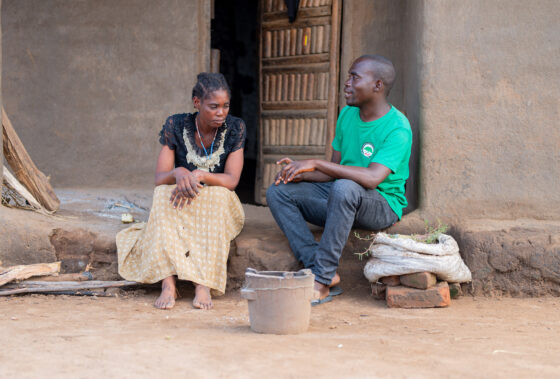In Rwanda, clean cooking starts with people like Valentine Mukakamana. In the lab of the Rwanda Standards Board, she tests cookstoves for safety and efficiency. With support from EnDev, her work helps bring certified, low-emission cookstoves from the lab to kitchens across the country
The water is boiling, and steam rises from the pot placed on a cookstove. With a concentrated look, Valentine Mukakamana watches the display of measuring devices, analytically measures filter papers and records the figures. Fine particulate matters below 218 milligram per megajoule delivered and Carbon Monoxide below 7.2 gram per megajoule delivered – good values.
Valentine works as laboratory personnel in the cookstove testing lab of the Rwanda Standards Board (RSB), a governmental institution with the overall mission of providing standards-based solutions for trade promotion and consumer protection. Today, she is testing the stove’s fuel efficiency and the emissions it emits. Before she started the Water Boiling test, Valentine brought the fuel into the right conditions using the so-called fuel conditioning climate chamber. By using this machine, the fuel gets the perfect conditions – not too wet and not too dry – important for the testing of particular matters. By the end of the day, after one week of testing, she will have enough data to make a judgment about the stove: Does the model meet the efficiency, emission reduction, safety and durability standards that Government of Rwanda has set for all cookstoves?
The Government of Rwandan has committed to only allowing stoves with a minimum standard of Tier 3 from January 2024 onwards. This means that the stoves meet certain standards and criteria outlined in the ministerial guidelines with regards to efficiency, emissions, safety and durability. At the same time, with the “Made in Rwanda” initiative, the government is promoting the local production of cookstoves to create jobs and reduce dependency on imports.
Quality Standards as the Key to Safe and Efficient Cookstoves

EnDev supports Rwanda in this endeavour and works closely with the government and the RSB. Together, they are laying the groundwork necessary for people and businesses to have long-term access to clean cooking technologies. Standards and certifications build consumer trust, improve product quality, allow clean cooking businesses to access finance opportunities and allow manufacturers to work with clear guidelines. By strengthening institutions, setting mandatory standards, and improving local testing and certification systems, the project contributes to an enabling environment for clean cooking in Rwanda.
Inefficient stoves not only consume more fuel and heat is lost but also produce harmful smoke, which poses health risks to cooks – mostly women in Rwanda – and the surrounding children. Setting standards and creating certification mechanisms ensures that only high-quality products enter the market. The RSB test lab plays a key role in this process: It provides evidence that cookstoves produced in Rwanda meet these requirements.
Local Test Capacities for Faster Market Entry

Valentine and her colleagues have now tested 432 different stove models. The testing process now only takes four weeks for testing 6 to 10 stove samples instead of six months – made possible by support from EnDev. The programme has supplied modern testing equipment, including precision scales and measuring devices, and has supported the RSB to recruit permanent staff, as well as the training of personnel for cookstove testing laboratory.
“Before, we could hardly keep up; we had neither the right equipment nor enough staff to test all the stoves,” recalls Bernard Kabera, the director of the Material Testing Laboratories Unit at RSB. Prior to the lab upgrading, manufacturers who wanted their stoves to be tested had to send their stoves to Uganda, which incurred high costs and long waiting times. With the modernisation of the lab, Rwanda now offers its own testing capacities. This makes it easier for local producers to certify their stoves and sell them at market – ensuring that more efficient and cleaner stoves are available faster.
Before, we could hardly keep up; we had neither the right equipment nor enough staff to test all the stoves.
Bernard Kabera, Director of the Material Testing Laboratories Unit at Rwanda Standards Board
The test lab is a crucial step forward in developing sustainable cooking solutions in Rwanda. In the future, RSB aims to undergo the accreditation process of the International Standard Organization (ISO 17025), becoming the second accredited lab in the region after Uganda. Through policy advice and close collaboration with the RSB, EnDev helps ensure that standards are not only on paper but are also consistently enforced. Thanks to the strengthening of the test lab and more efficient certification processes, an increasing number of households in Rwanda are able to switch to safe, certified, and low-emission cookstoves.
The multi-donor partnership “Energising Development” (EnDev) is supported by the Federal Ministry for Economic Cooperation and Development (BMZ), the Dutch Ministry of Foreign Affairs (DGIS), the Norwegian Ministry of Foreign Affairs and the Norwegian Agency for Development Cooperation (NORAD), as well as the Swiss Agency for Development and Cooperation (SDC).
The support for the test lab is part of the EnDev project “Reducing the Climate Impact of Cooking in Rwanda through Improved Cooking Energy Systems (ReCIC),” which is co-financed by the European Union under the “Global Climate Change Alliance Plus (GCCA+)” initiative.





